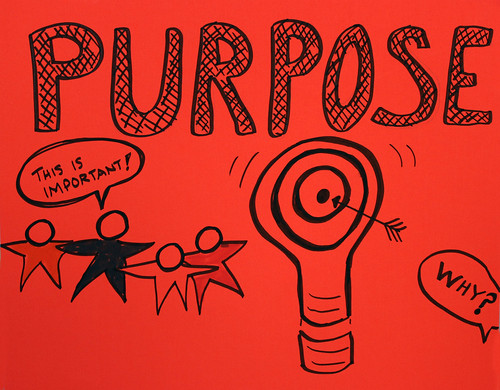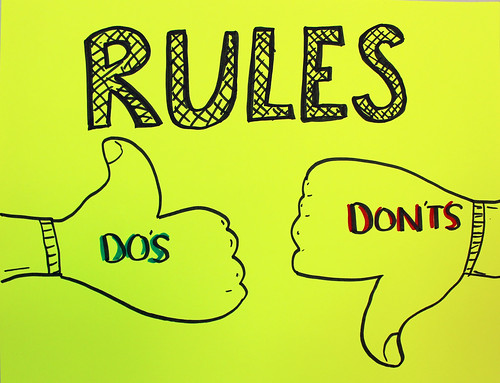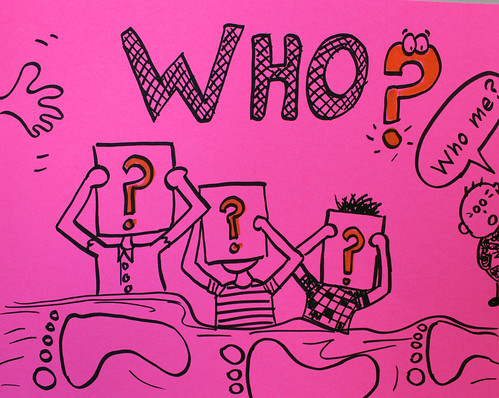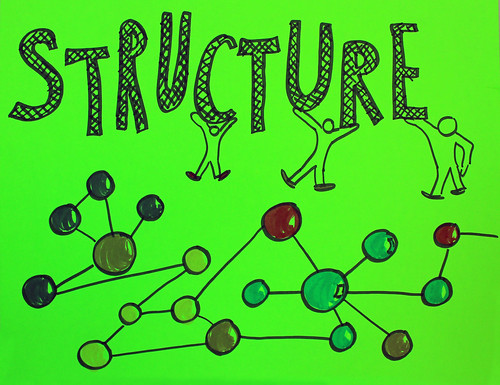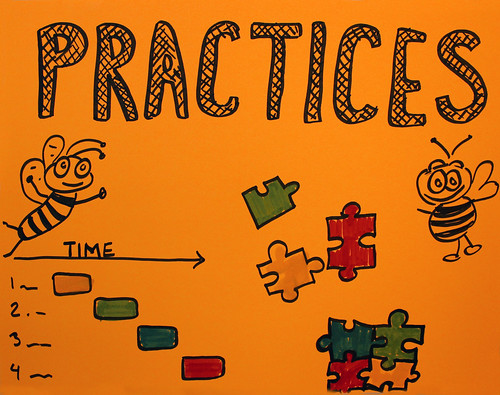I take no credit for the use of this excellent metaphor for thinking about new spaces for productivity and learning, but
Alice MacGillivray has been engaging people in conversations related to intellectual estuaries and boundary spanning for years. Next week I have the honour of co-facilitating the
Intellectual Estuaries workshop with Alice and
Nancy White at the
2014 Canadian Network for Innovation in Education conference in Kamloops. I'm excited to be collaborating with these fun and amazing women!
 |
| Alice engaging the twitterverse during a Community Enthusiast event, photo by Hilda Anggraeni |
I was fortunate to be
Alice's Dissertation Fest "host" at
CPsquare in 2008 where she invited us to explore ideas around boundaries, the topic of her dissertation:
Perceptions and Uses of Boundaries by Respected Leaders — a Trans-disciplinary Inquiry.
Later, Alice co-facilitated the
Vancouver Gathering of Community Enthusiasts events in
May 2010,
May 2011, and
June 2012 and each time introduced new metaphors, technologies, and ways of thinking about engagement.
As I was digging into the workshop planning with Alice and Nancy, I was transported back to the 2010 Community Enthusiasts event where, thanks to Alice's facilitation and Nancy's excellent visuals, we harvested quite a collection of thought-provoking ideas and questions related to working across boundaries, and informal and formal learning and meeting places. It's a great example of the power of metaphors for thinking about, and rethinking, communities of practice and social learning. I'm capturing it here in point form (partially because I don't trust Flickr will be with us forever!):

Sticky comments by participants:
- Reflection:
* group still together?
* getting big pictures?
* check in
* change leadership?
- Time to strategize
* Are we going in the right direction?
* check gear - are we ok?
- Places of discovery
- A landmark
* charts the course
- Time to slow down (deliberate)
* look around (back and forward)
* a luxury (build it into the project!)
* do it when things go wrong...reframe the problem
- Can be treacherous
* current flow changes...could dump!
* tough to get out of eddy
* Is that where you want to go?
Sticky comments by participants:
- understanding the value of not trying to bring together things that don't mix
- Too much diversity too soon can be a problem. Need to grow organically.
- Things from 'outside' are sometimes seen as having more value
- Narrowing too quickly can be a problems too
- Keeping history and noting significance so that later-comers can understand value of confluence
Sticky comments by participants:
- History of community
- Mutualism = give and take
- Community: time, goal, project durations
- Power players
- Partnership?
- Goal is mutualism
- There are builders, users, and mutualizers
- Communities across boundaries
Sticky comments by participants:
- Individual vs communal migration
- hibernation, going dormant for awhile...allows new leadership to take over
- Difficult to report on metrics
- How to measure vibrancy?
- Are there scenarios of over population in online communities?
- Migration pathways...what they tell us of needs/habits of communities
- Migration as a cycle...re-energize with change of season...return, journey between communities
- Collective of smaller communities -- allows for more movement
- What are the attributes of a community that encourage you to stay or go?
- Migrating can break cliques
- Something to be embraced...constant growth sustainable?
- Carrying capacity
Sticky comments by participants:
- Keep people and situations focused
- Interpretation of what $s are for
- Leaders can be the less likely!
- Different world views
- Personal comfort levels -- what is good for one is not necessarily good for another
- Resource management
- Don't all look the same
- Nurturing place of socialization
- Place for establishing community
- Protection
- Tendency to interfere -- knowing when to, or not!
- History and change...collision vs opportunities
- # Beavers -- food source, protection, MAJOR accomplishments
- Provide a safe place, risk management, experimentation
And finally, I included this one because the little people pulling Alice to the edge of her boundary is such a good example of how
crossing it make a difference: "
Alice goes public!"
For the Intellectual Estuaries workshop at CNIE, we want to support this same type of energy, using metaphor to encourage rich conversations. In a nutshell, we hope participants will think about their own contexts, and how intersections of groups, disciplines, cultures, locations, age... whatever... can create new synergies. As Alice puts it, these intersections are not a guarantee for success, but they can make space for unplanned successes.
Workshop Details and Plan
We didn't prepare slides for the workshop. Rather we gathered some resources and outlined the activities on Nancy's Full Circle wiki. I'm copying it here because it's always good to have a backup!
Intellectual Estuaries
In nature, estuaries are meeting places. Fresh water, salt water and land come together, enabling productivity and biodiversity that is greater than the sum of its parts. Similarly, university faculty members and learning and development professionals may be able to create—or enable the creation of “intellectual estuaries.” These spaces bring together often-unlikely groups of people for learning that can be greater than the sum of the knowledge they bring.
Design of these spaces involves boundary spanning or blurring, openness to possibility, productive tensions and inherent ambiguities. Intellectual estuary design is to traditional instructional design what the un-conference is to the conference.
(Full description
on Sched.org)
Overview from Alice MacGillivray
Alice is unable to join the workshop because of a scheduling conflict, so she prepared this video for us. Now she has a workshop presence without being there. Good boundary spanning, eh?
Estuaries: Community Meeting Places
An image to help us get our heads into estuaries as a metaphor.
Organizational Charts - Why is this model so tenacious?
Underneath, workplaces look like this
What Alice has to say about that
The Problem?
Creative work and progress in communities of practice doesn't filter back to the centre.
Our challenge
Interesting Stuff happens at the boundaries. How can we pay attention to that?
How can we apply these ideas to our own contexts?
What are the boundaries we have set up? How can we make them more permeable?
How can we bring together unlikely groups of people? Who would they be?
Our Stories
Alice has some excellent examples demonstrating Intellectual Estuaries based on her own experiences at Royal Roads University (RRU) and CPSquare, and also Fielding Graduate University. The story I'm most familiar with is collaboration between RRU and CPSquare, where members of a course KM 650 (can't find the title!) participated in the CPSquare Foundation of Communities of Practice workshop as part of their course requirements.
Activity: 25/10
(
from Liberating Structures)
1. Write down your bold idea
2. Mill around, pass your card to someone else, quickly review
BELL!
3. Stop passing cards and pair up with someone nearby. Exchange thoughts.
4. Rate the idea on the card you are holding using a score of 1-5 (5 is high). Write the score on the back of the card.
BELL!
5. Continue to pass cards around
BELL!
6. Repeat 3 more times | Exchange > BELL > Exchange > BELL > Exchange > BELL
7. Add up the score on the card you are holding
8. Report out from those holding a score of 25, then 24, and so on until top 10 ideas have been shared
9. Comments on process?
Next Steps
I plan to take photos and report back on this session and others at the CNIE conference. Here's
the full schedule.
UPDATE: Nancy White and I had a debrief with Alice about the session. Here are summary notes from the conversations, notes from the cards, and process comments:
Trio conversation
What emerged -- brief conversation about intellectual estuaries and what's happening in your workplace?
- There are out-of-necessity barriers rather than out-of-necessity innovation
- The challenge can be what is perceived as necessity
- What new metaphors can we offer that will help people to break out of silos?
- Network structures don't get useful until they're used and the don't get used until they're useful
- Incentives are like invasive species
- Sometimes there is a natural balance
- Sometimes meeting of edges is deliberate
- Semiosis - ideal if it can be seen as natural benefit
- Often this is evolutionary, so need to understand where we are
- There are so many amazing practitioners who don't know how amazing they are. How to discover these people?
- Often with the right leader can make silo issues disappear
- Someone new in a leadership position can make all the difference
- People who do the bridging, know and understand the social fabric, can be in a position of influence (different than authority)
Notes From Cards
Ideas from top ranked to lower ranked:
- Invite students into course design
- Encourage interdepartmental communication
- Bring more students into our design processes
- "Faire" for sharing ideas among departments
- Bring in an Aboriginal elder to plan diversity MED course
- co-op existing event (executive) or volunteer to design
- find language to bridge differing perspectives
- bring writing, research, design, development to disciplines for students
- energize our university-wide social network
- Pair ID in projects - mix experiences
- meet as many people as possible
- add a F.G. student to my thesis committee
- do a hallway plan for a learning event
- conference
- provost task force for learning tech. Reps from 14 faculties and library and IT and Ed. Dev + ... Students union, grad student assoc. Cross pollinate. Intentional edge effect
Reflection on Process
- Time was too short
- Good stuff on what. now want to talk about HOW
- liked the 25/10 process
- See the book "What the Robin Knows"
 Beverly Wenger-Trayner is a learning theorist and consultant specializing in communities of practice and social learning systems. Her expertise encompasses both the design of learning architectures and the facilitation of processes, activities, and use of new technologies.
Beverly Wenger-Trayner is a learning theorist and consultant specializing in communities of practice and social learning systems. Her expertise encompasses both the design of learning architectures and the facilitation of processes, activities, and use of new technologies.


